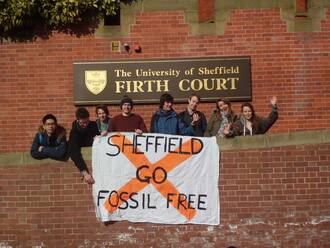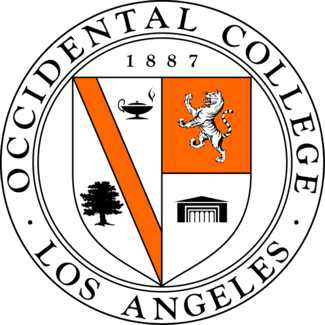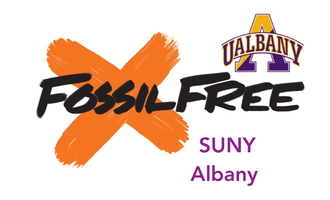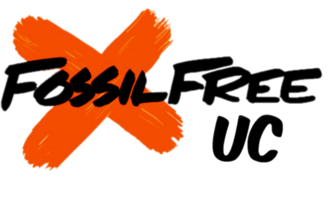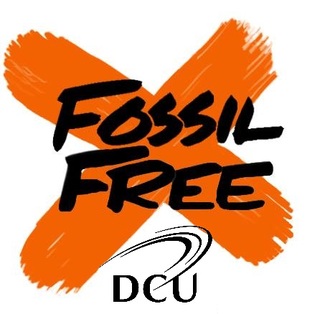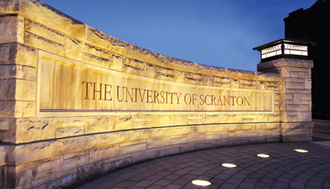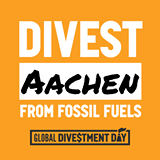-
University of Sheffield for Fossil Free ResearchFossil fuel companies are driving and profiting from the climate crisis and the havoc it is wreaking to the lives of the world's most vulnerable people. The University has committed to financial divestment, but this is not enough. By severing its research links with the fossil fuel industry, the University can become fully fossil free and most effectively revoke the social license it affords to fossil fuel companies to perpetuate climate chaos and stop contributing to the production of co2lonial knowledge used to extract fossil fuels itself.487 of 500 SignaturesCreated by Ruby Lee
-
ST. EDWARD'S, DIVEST FROM FOSSIL FUELSAs global citizens we question the moral implications of profiting from the fossil fuel industry. The impacts of climate change are disproportionately affecting minority populations of race and class, as well as those who have contributed least to global warming.142 of 200 SignaturesCreated by nick thompson
-
Divest Occidental College From Fossil FuelsWe must divest if we are to regain our integrity as an institution. Occidental College prides itself on being a liberal arts institution that shapes citizens who will contribute to and better the world society. Therefore, it should not be harming our environment and society through financial support of the fossil fuel industry. Climate change is real. The scientific consensus is clear and overwhelming; we cannot safely burn even half of global fossil-fuel reserves without dangerously warming the planet for several thousand years. If we do not fully commit ourselves to substantive action as individuals, as institutions, and as a society, climate change will accelerate and intensify on an unprecedented scale. Colleges and universities are unique in the abundant wealth they hold in social, intellectual, and financial capital. This makes these institutions better suited than any other entity to lead our society toward a more just and sustainable future. We have a duty to apply our intelligence and creativity to the enduring problems of our civilization, which include climate change. In its mission statement, Occidental College calls on its students to gain a "deeply rooted commitment to the public good." It would be hypocrisy for the college not to pursue the same goal. Despite using environmental sustainability to enhance its brand, Occidental College backs the destructive fossil fuel industry through its investments. This lack of integrity is unacceptable. If Occidental is to fulfill its mission and uphold its values as an institution, it must divest from fossil fuels. If our open-minded and reputable college cannot divest from the destructive fossil fuel industry, then who will? To regain its integrity, Occidental must divest. In doing so, we will set a moral standard that other institutions will be inspired to live up to.646 of 800 SignaturesCreated by Alex Lukas
-
Reinvest USFThe impacts of a warming planet have been made evident in the past year by record breaking temperatures, alarming projections of future sea-level rise, and links between drought, rising tensions in the middle east, and the ongoing refugee crisis. Experts agree that global warming caused by humans burning fossil fuels will continue to accelerate and intensify these tragic climate disasters. The poorest and most vulnerable will experience the effects of this changing climate first and most dramatically. The scientific consensus is clear and overwhelming; we cannot safely burn even half of global fossil-fuel reserves if we want to keep warming at or below a level that has deemed safe by world leaders and the scientific community. The companies that hold these reserves spend incredible amounts of money every year funding climate change denial and lobbying our elected officials to not enact legislation that would hasten the transition from fossil fuels to renewables. Therefore, it is impossible for USF to avoid hypocrisy if they continue to invest in an industry that's business plan runs counter to the university's moral conscience and values. Let's follow our peers who have divested at Stanford University, Georgetown University, the University of California system, San Francisco State University, California's state pension fund, Norway's sovereign wealth fund, and hundreds of other institutions whose total value exceeds $3 trillion dollars. The example set by these institutions demonstrates that USF can divest from fossil fuel companies without negatively affecting returns on its endowment. As public pressure to confront climate change builds, we call on University of San Francisco to immediately freeze any new investment in fossil-fuel companies, and to divest within five years from direct ownership and from any commingled funds that include fossil-fuel public equities and corporate bonds. We believe such action on behalf of USF will not only be a sound decision for our institution’s financial portfolio, but also will further align the university's actions with its values. Please follow us on social media: https://www.facebook.com/reinvestusf/ https://twitter.com/reinvestusf5 of 100 SignaturesCreated by Amelia Barton
-
SUNY Albany Invests in a cleaner futureIf we are serious about addressing the climate crisis, we must slash our consumption of fossil fuels, and that means a lot more than using fluorescent light bulbs and lowering our thermostats.Put simply, it is nearly impossible to function in our culture without relying heavily on fossil fuels. The fossil fuel industry has maintained a stranglehold on our way of life not because of consumer choice, but because consumers are effectively given no other choice. Climate change should be solved not by expecting individuals to make choices that are hardly within their power to make, but by challenging the structures that are at the heart of the climate crisis.10 of 100 SignaturesCreated by Alyssa Losee
-
Divest UC From Fossil FuelsIn UC's strategic plan one of the three main objectives is: "to contribute to the building of fair, prosperous and sustainable communities which are respectful of their Indigenous past and committed to redressing disadvantage." It is well known that Indigenous communities are some of the worst hit by the impacts of climate change, so for the university to achieve their objective it is vital to divest from fossil fuels. In order to contribute to the building of sustainable communities, we our selves must become one. UC proudly speaks of Adam Verwey, former student and president of the UC Student's Association, who was involved in the start up of fossil free superannuation company Future Super. They hang posters of him and his achievements around the university. With this in mind it makes zero sense that we are still invested in fossil fuels. UC needs to step up and become a leader on this issue and move on from the past of fossil fuels. Together we can put this issue on the agenda of our Vice Chancellor and the university board, and make our university fossil free.19 of 100 SignaturesCreated by Violet Cully

-
Divest SJSU From Fossil FuelsIt is not sustainable for San Jose State University to invest in fossil fuels. With fossil fuel dependency declining, investing in better performing stocks will be necessary for SJSU. As a student at San Jose State University, I want my school to have corporate social responsibility and not support the fossil fuel industry because of the effects it has on our environment. Climate change is accelerating. We are witnessing the increasing impacts of a warming planet more and more consistently; in this last year alone our country experienced record-breaking heat, droughts, and hurricanes, which impacted hundreds of thousands of people and cost our country hundreds of billions of dollars. Hurricane Sandy alone caused $50 billion in damages. Experts agree that global warming caused by humans burning fossil fuels will continue to accelerate and intensify these tragic climate disasters. The scientific consensus is clear and overwhelming; we cannot safely burn even half of global fossil-fuel reserves without dangerously warming the planet for several thousand years.38 of 100 SignaturesCreated by Matthew Nicolay
-
Divest @ DCUThe current relentless use of fossil fuel reserves is too high to ensure that the average global temperature does not reach a 2 ̊C rise. Climate change and fossil fuel markets are interconnected. The use of fossil fuels contributes to the majority of greenhouse gases (GHG) emissions. Efforts to abate GHG emissions to mitigate climate change will likely affect global fossil fuel markets. This means anyone who has investments in fossil fuel companies will suffer huge devaluation. By actively investing money in fossil fuels we are not acting responsibly. We believe divestment from fossil fuels will ensure the welfare of future generations of graduates, staff and the wider DCU community and also for the institution’s financial portfolio. We need to stick to our Strategic Plan and develop and implement a comprehensive Environmental Sustainability Strategy and divest from fossil fuels.252 of 300 SignaturesCreated by DCU EcoSoc
-
Go Fossil Free!Climate change is accelerating. We are witnessing the increasing impacts of a warming planet more and more consistently; in this last year alone our country experienced record-breaking heat, droughts, and hurricanes, which impacted hundreds of thousands of people and cost our country hundreds of billions of dollars. Hurricane Sandy alone caused $50 billion in damages. Experts agree that global warming caused by humans burning fossil fuels will continue to accelerate and intensify these tragic climate disasters. The scientific consensus is clear and overwhelming; we cannot safely burn even half of global fossil-fuel reserves without dangerously warming the planet for several thousand years.9 of 100 SignaturesCreated by Leif Taranta
-
Divest University of Scranton From Fossil FuelsAs a Jesuit University, the University of Scranton knows the importance of taking care of the Earth. The University teaches about taking care of God's planet and this offers them an opportunity to live by example. Until the University divests from fossil fuels and invests in "greener" options, it is not putting actions behind its values and teaching. Climate change is accelerating. We are witnessing the increasing impacts of a warming planet more and more consistently; in this last year alone our country experienced record-breaking heat, droughts, and hurricanes, which impacted hundreds of thousands of people and cost our country hundreds of billions of dollars. Hurricane Sandy alone caused $50 billion in damages. Experts agree that global warming caused by humans burning fossil fuels will continue to accelerate and intensify these tragic climate disasters. The scientific consensus is clear and overwhelming; we cannot safely burn even half of global fossil-fuel reserves without dangerously warming the planet for several thousand years.202 of 300 SignaturesCreated by Megan Schane
-
Divest QMUL from fossil fuelsClimate change is happening and it is harmful; very few people deny this nowadays. So why is it okay for QMUL and other universities and organisations, which are supposed to be setting an example to the younger generation, to profit from this damage? Too many UK universities support the fossil fuel industry directly through their research, their endowments and investments and their partnerships with some of the biggest fossil fuel companies in the world like BP and Shell. For this reason, UK students have decided to take on the fossil fuel industry by getting our universities to go Fossil Free. People & Planet is joining forces with the 350.org campaign that has been sweeping across North American campuses. By divesting, QMUL will join many universities, religious institutions and local governments across the world that have already committed. Only with a combined effort can we make a substantial dent in the financial support that fossil fuel companies require to survive. The response of QMUL to a Freedom of Information Act request last year proved that the university does have investments in fossil fuels. However, the university refused to specify how much money and in which companies. However, the response did inform us that a meeting took place last June to discuss the possibilities of divesting from fossil fuels. The decision was made to maintain current investments but now we known they have been considering it and they can't go back. Now we need to turn up the pressure and show them we mean business! Human health at risk As seen in the QMUL Ethical Investment Policy, Queen Mary is already committed to avoiding direct investment in any company whose business activity is tobacco products, reasoning that the College seeks to promote good health through its School of Medicine and Dentistry. [1] This reasoning can also be applied to fossil fuel divestment because, as the 2015 Lancet Commission reads, climate change is “the greatest threat to human health in the 21st century”. [2] According to the World Health Organisation, from the years 2030 to 2050, climate change is expected to cause approximately 250,000 additional deaths per year by affecting determinants of health such as clean air, safe drinking water, sufficient food and secure shelter. [3] It is entirely conflicting to simultaneously promote good health through the medical school and invest in companies that damage the health of the world. The British Medical Journal has appealed to health institutions to divest and early victories from the British Medical Association, the University of Glasgow and the London School of Hygiene and Tropical Medicine show that what we ask is easily achievable and health institutions should stick together and set an example to the world. The guiding principle of ‘do no harm’ should be applied to the full range of activities that Barts and the London and QMUL are involved in. Finances at risk The ethical investment policy also states that “taking ethical and environmental considerations into account in an investment decision will enhance the returns available in the long term”. [1] it is now apparent that investments in fossil fuel companies are not sustainable. The share prices of coal, gas and oil companies depend on the value of known carbon reserves. Considering that countries have agreed to limit global warming to 2°C, 80% of known carbon reserves will have to remain in the ground; [4] “the majority of the world’s reserves are unburnable” says Mark Carney, Governor of the Bank of England. Fossil fuel assets pose a serious vulnerability to the stability of the financial system in the carbon-constrained world of the future. QMUL is therefore exposing itself to major financial risk by continuing to invest the school’s endowments in fossil fuels. The Environmental Policy of QMUL says “the College is committed to the principles and practices of environmental protection and environmental sustainability across all areas of activity, with College-wide involvement and responsibility”. [5] It is apparent that many official policies of QMUL would converge on a commitment to divest from fossil fuels yet so far no such action has been taken. From Canada’s dirty tar sands to Arctic drilling and hydraulic fracturing (or fracking) for shale gas - the fossil fuel industry is scraping the bottom of the barrel and causing huge environmental and human devastation in the process. Withdrawing our institutions’ financial and moral backing for this climate-wrecking industry is crucial to tackling climate change. References: [1] http://www.arcs.qmul.ac.uk/docs/policyzone/118943.pdf [2] http://www.thelancet.com/journals/lancet/article/PIIS0140-6736(15)60854-6/abstract [3] http://www.who.int/mediacentre/factsheets/fs266/en/ [4] http://www.nature.com/nature/journal/v517/n7533/abs/517150a.html [5] http://www.qmul.ac.uk/about/sustainability/Documents/80817.pdf783 of 800 SignaturesCreated by Dominic Dee
-
RWTH Aachen: Raus aus fossiler EnergieDer kürzlich veröffentlichte neuste Bericht des Weltklimarats spricht eine deutliche Sprache. Wenn wir den Anstieg des globalen Klimas auf unter 2°C begrenzen wollen, darf der Großteil der fossilen Energiereserven wie Kohle, Öl und Gas nicht verbrannt werden.23 of 100 SignaturesCreated by Gary Evans

